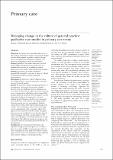Files in this item
Managing change in the culture of general practice : qualitative case studies in primary care trusts
Item metadata
| dc.contributor.author | Marshall, MN | |
| dc.contributor.author | Mannion, R | |
| dc.contributor.author | Nelson, E | |
| dc.contributor.author | Davies, Huw Talfryn Oakley | |
| dc.date.accessioned | 2014-04-30T09:31:00Z | |
| dc.date.available | 2014-04-30T09:31:00Z | |
| dc.date.issued | 2003-09-13 | |
| dc.identifier | 258572 | |
| dc.identifier | 2ac8362a-21dd-435f-9ab4-7b5d0310b600 | |
| dc.identifier | 000185358700025 | |
| dc.identifier | 0141724834 | |
| dc.identifier.citation | Marshall , MN , Mannion , R , Nelson , E & Davies , H T O 2003 , ' Managing change in the culture of general practice : qualitative case studies in primary care trusts ' , British Medical Journal , vol. 327 , pp. 599-602 . https://doi.org/10.1136/bmj.327.7415.599 | en |
| dc.identifier.issn | 0959-8138 | |
| dc.identifier.other | ORCID: /0000-0002-2653-3695/work/57821508 | |
| dc.identifier.uri | https://hdl.handle.net/10023/4668 | |
| dc.description.abstract | Objectives To explore the potential tension between the need for managers to produce measurable change and the skills required to produce cultural change, and to investigate how managers of primary care trusts are attempting to deal with this tension. Design Qualitative case studies using data derived from semistructured interviews and a review of published documents. An established cultural framework was to used to help interpret the findings. Setting Six primary care trusts in England purposefully sampled to represent a range of cultural, structural, geographical, and demographic characteristics. Participants 42 interviews with 39 different senior and middle primary care trust managers conducted over an 18 month period. Results We found two distinct and polarised styles of management. One group of managers adopts a directive style and challenges the prevailing norms and values of clinicians, an approach characteristically seen in organisations with hierarchical cultures. This group is made up mostly of senior managers who are driven principally by the imperative to deliver a political agenda. Managers in the second group are more inclined to work with the prevailing cultures found in general practice, attempting to facilitate change from within rather than forcing change from outside. This management style is characteristically seen in organisations with a clan-type culture. The approach was manifest mostly by middle managers, who seem to act as buffers between the demands of senior managers and their own perception of the ability and willingness of health professionals to cope with change. The different management approaches can lead to tension and dysfunction between tiers of management. Conclusions The development of primary care depends on high quality managers who are able to draw on a range of different management skills and styles. Managers ate most likely to be effective if they appreciate the merits and drawbacks of their different styles and arc willing to work in partnership. | |
| dc.format.extent | 4 | |
| dc.format.extent | 89210 | |
| dc.language.iso | eng | |
| dc.relation.ispartof | British Medical Journal | en |
| dc.subject | Clinical governance | en |
| dc.subject | Autonomy | en |
| dc.subject | Manager | en |
| dc.subject | R Medicine (General) | en |
| dc.subject.lcc | R1 | en |
| dc.title | Managing change in the culture of general practice : qualitative case studies in primary care trusts | en |
| dc.type | Journal article | en |
| dc.contributor.institution | University of St Andrews. School of Management | en |
| dc.identifier.doi | https://doi.org/10.1136/bmj.327.7415.599 | |
| dc.description.status | Peer reviewed | en |
| dc.identifier.url | http://www.scopus.com/inward/record.url?scp=0141724834&partnerID=8YFLogxK | en |
| dc.identifier.url | http://dx.doi.org/10.1136/bmj.327.7415.599 | en |
This item appears in the following Collection(s)
Items in the St Andrews Research Repository are protected by copyright, with all rights reserved, unless otherwise indicated.

